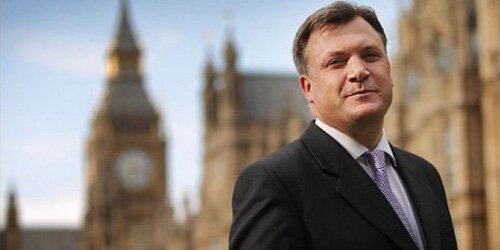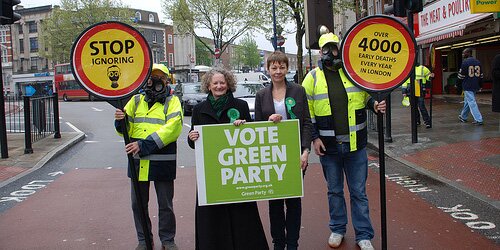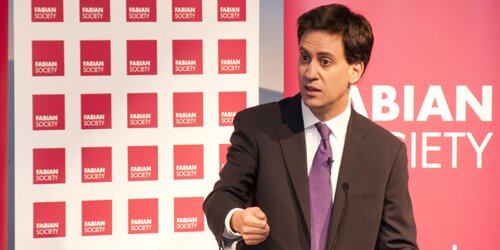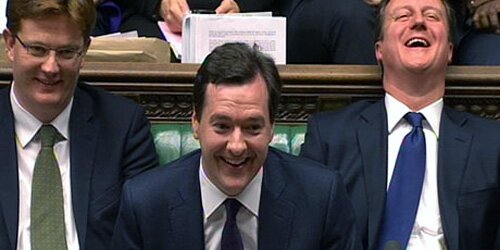Are UKIP and the BNP Blair’s ideological legacy?
9:00 am - June 12th 2009
| Tweet | Share on Tumblr |
 Tony Blair built his success on neutralising ideological debate. The New Labour project, which is now in collapse, had two aspects and one purpose: to steal the Conservatives’ clothes, to strip Labour of its ideological commitments, and to do it all in the pursuit of power.
Tony Blair built his success on neutralising ideological debate. The New Labour project, which is now in collapse, had two aspects and one purpose: to steal the Conservatives’ clothes, to strip Labour of its ideological commitments, and to do it all in the pursuit of power.
As Blair put it himself: “I have taken from my party everything they thought they believed in, I have stripped them of their core beliefs. What keeps them together is success and power”. (Andrew Rawnsely, Servants of the People pg 195).
But the New Labour project didn’t just strip Labour of its ideology and wrong-foot the Tories to generate electoral success. It re-defined the nature of political success as occupation of the centre ground via a deliberately non-ideologically appeal to vague notions of a “Third Way”, or “community” or “progressivism”. In the process, New Labour stripped the other main parties of their ideology too.
After all, what do the Tories actually stand for nowadays? What are their policies? What do they believe in? Deducing from Cameron’s performances at Prime Minister’s questions – the only apparent indicator of Conservative policy – the Tories believe in anti-Keynesian spending cuts during recession, calling a general election, the resignation of Brown and…what?
As Prem Sikka has pointedly asked, “Mr Cameron, what exactly are your policies?” It’s a question we all need an answer to. Because heading into power is a first for British politics: a party which has no policies, no legislative agenda and no identifiable ideology whatsoever.
Sunday’s coverage of the EU elections was, in this respect, highly instructive. All three of the major parties conspicuously failed to state what it is they stand for. Labour were (unsurprisingly) reduced to mutterings about how the EU elections demonstrated a protest vote which they sheepishly promised to heed before the general election.
The Tories used the occasion as an opportunity to call repeatedly for Gordon Brown to stand down and gesture vaguely about “returning power to British people”. Not once can I remember them articulating what they exactly stand for, and claiming that their EU victories are a corresponding endorsement of those principles. This is of course quite possibly due to the fact that despite their lead in seats, the Tories did not capitalise significantly on Labour’s electoral collapse.
The Lib Dems – supposedly the main pro-European party in the UK – were unconvincing. In fairness, Nick Clegg has undertaken some efforts in recent weeks to promote the EU on television, and the Lib Dems do suffer from a hostile Euro-sceptic media. But Clegg didn’t root EU support in underlying of ideological grounds; pro-Europeanism was presented as a free-standing conviction. On the night, the Lib Dems failed to make convincing arguments for why the EU might be a good thing and to explain why the party is therefore pro-European. Instead, all we got were mumblings about Labour failings and why being placed 4th wasn’t really a big deal.
By contrast, the two parties who came out loud and clear with statements of what they stood for were UKIP and the BNP. UKIP’s “ideology” may extend no further than economic isolationism and xenophobic immigration control – the rhetoric of unthinking, racist 19th-Century style nationalism. But compared to the mainstream three, this rhetoric shone as a burning beacon of ideological conviction; a declaration that no matter how simplistic and crass it may be, UKIP believes in something.
The BNP is a foul political entity, yet it quite obviously has an ideology. If Griffin is to be believed, that ideology is simply “to protect the indigenous white population”. Anyone scratching beneath the surface will quickly discover the vicious racism, anti-Semitism, white-supremacism and thorough-going Fascism that is the true nature of BNP ideology. But it’s an ideology nonetheless – and one which the BNP proudly (albeit in muted form) proclaimed all over national television.
Which leads one to ponder whether this is the ultimate legacy of New Labour. The quest for power without purpose has taken ideology out of the hands of the mainstream and put it into the clutches of extremists.
And perhaps – more than anything else – this proves Blair was wrong all along. Ideology matters. Just ask the 13 UKIP and 2 BNP MEPs packing their bags for Brussels.
| Tweet | Share on Tumblr |  |
Paul Sagar is a post-graduate student at the University of London and blogs at Bad Conscience.
· Other posts by Paul Sagar
Story Filed Under: Blog ,Conservative Party ,Labour party ,Our democracy ,Westminster
Sorry, the comment form is closed at this time.
Reader comments
“a party which has no policies, no legislative agenda and no identifiable ideology whatsoever.”
A good description of our current government.
The Tories’ agenda is to abolish the Beveridge settlement (which, in principle, even Thatcher accepted) by means of localisation. Virtually every government function (including payment of pensions and other benefits) will be passed down to your local Council which will be relieved of all its duties e.g. to educate children, care for the disabled, mend the roads etc in favour of a general competence to do anything not actually illegal. The Block Grant will be withdrawn and the wretched local councillors will have to decide which of their consituents to starve to death.
Of course Cameron doesn’t describe it in those terms but that’s what he means.
>>”The New Labour project, which is now in collapse, had two aspects and one purpose: to steal the Conservatives’ clothes, to strip Labour of its ideological commitments, and to do it all in the pursuit of power.”
I hadn’t seen it described that accurately or concisely in a while, but you’re absolutely right.
LS,
You are quite right.
Interesting piece. You forgot the Greens though, whose vote went up by far more than the BNP. Ideology again you see.
I keep seeing that the Tories have no policies. I can only assume that this is a rhetorical flourish, as it really isn’t hard to find them out. These are, only by way of example, their short term economic policies, i.e.: not aspirations about stability or austerity but detailed policy committments:
We will freeze council tax for two years by reducing wasteful spending on advertising and consultancy in central government
We will introduce a £50bn National Loan Guarantee Scheme to underwrite
bank lending to businesses and get credit flowing again
We will provide tax cuts for new jobs with a £2.6bn package of tax breaks to get people into work, funded by money that would otherwise go on unemployment benefit
We will cut the main rate of corporation tax to 25p and the small companies’ rate to 20p, paid for by scrapping complex reliefs and allowances
We will give small and medium-sized businesses a six-month VAT holiday, funded by a 7.5% interest rate on delayed payments
We will cut National Insurance by 1% for six months for firms with fewer than five employees, paid for from the above changes to the company tax regime
We will abolish Stamp Duty for nine out of ten first-time buyers and raise the Inheritance Tax threshold to £1 million. Both of these changes will be funded by a flat-rate charge on non-domiciles.
You can, of course, disagree with these policies, or say they won’t be enough/are too much. But simply to deny that they exist is a bit intellectually dishonest.
Paul.
Absolutely Spot-on.
Funny I was thinking on similar lines the other day but you articulated it like no-one else could.
It’s interesting how little analysis of what “Blairism” did has taken place since its departure.Perhaps it’s physiological as it was only two years ago that he fu***d off.
What I fear is that our simplistic historians will remember him as the magician who landed Labour three historic election victories, concentrating on short-term success but without seeing the devastating mid and long-term consequences of Blair’s ruthless quest for power.
I don’t agree with this – New Labour is/was intensely ideological. Two examples of this are:
1. running policies in the interest of the City of London, and taxing the resulting profits to fund public services
2. equality of opportunity and anti-discrimination
One reason why a lot of people vote UKIP and BNP are that they are angry that they perceive minority groups getting special favours (a backlash against New Labour’s ideological support of “equalities”/anti-discrimination), unhappiness at the outcomes of the policy of running overall economic policy to benefit the City, and particularly New Labour’s policy of enabling free movement of workers within the EU.
One of New Labour’s successes is that a lot of their underlying ideology has been so dominant in recent years that only on the political fringes has it been challenged. But, for example, there is nothing intrinsic to say that the public sector should explicitly aim to reduce inequalities, and just 20 years ago this used to be called ‘loony’.
My worry is that the votes for UKIP/BNP are at least as much because some people are angry about the best of what New Labour did as about their failings.
Yeah Balir is at fault for everything.
People want a fair society but not an ideologically dogmatic society — most people want to be part of an aspirational society while ensuring those who are the most vulnerable not only have a safety net but an opportunities ladder. Most people in Britain want the State and society to support those who need our help most yet at the same time they want people to take responsibility for their actions and their children.
People do not want a centralised bureaucracy determining the best way to educate our children or deliver health care in all parts of our country. The localism agenda of empowering schools and local communities came under Blair — much of which has been reveresed by this awful Prime Minister. It was Blair (while ridiculed by many for his lack of computer skills) called for eservices in 1999 and looked for empowering the individual through the Transforming Government Agenda enabled by ICT in 2005.
It was Blair who was ridiculed by the so called left and liberals when he called for tuition fees in Universities and Labour MPs went on television to call him Ramsay Blair but over 70% of England now agree that was a good move especially since we do not have the endowments that US universities get.
Blair did not want to get cornered by ideology — as it is not always the best way to govern as ideas and ideals can come from all parts of society with different outlooks and a good and effective leader combines them to make coherent narrative. Which Tony Blair succeeded in doing and Gordon Brown is absolutely pathetic at.
Finally, without power, all the ideas and idealism and convictions become no more than showpieces on blogs and while having meetings and coffees with the already converted. To win power you need to win elections because without power you have no chance to make any changes.
I wonder if anyone of you actually looked at the domestic policies that Blair undertook in his premiership or even international domain beyond Iraq. I think not.
“The quest for power without purpose has taken ideology out of the hands of the mainstream and put it into the clutches of extremists.”
I disagree as the vast majority of the country did not vote for extremists and niether would they during the general election. They want action and they want a better life — the people do not care much for ideology and the core voters are no longer enough to win elections.
Most voters today are floating who judge parties based on their stand on issues and what they can do for the electorate. I think Blair’s biggest legacy has been to build that overwhelming narrative across the majority of the population of having a fair and aspirational society, of passing down power to the local level, on focusing on results than the ideologies that deliver them. And today even the Conservatives have adopted his overall policy approach and so have the lib dems. And you call Blair a failure?
As President Obama wrote once ” Politics is a marriage between ideals and pragmatism* — Blair embodied it and he was probably the best at it.
Interesting, Blair delivered 3 major victories and a substantial majority (even after Iraq war) and what did Brown and his cabal do? Ensure Labour is out of power for a generation and therefore not having the opportunity to make any changes but snipe at the Government from the opposition benches.
This is of course quite possibly due to the fact that despite their lead in seats, the Tories did not capitalise significantly on Labour’s electoral collapse.
One last thing Tories do not need 40% of the vote to get a very good working majority if the share of Labour vote is below 30% (which is quite likely) — all they need is a 13-14 point difference between themselves and Labour to clean up.
“UKIP’s “ideology” may extend no further than economic isolationism”
That’san extraordinarily strange way to describe a party that loudly proclaims itself to be in favour of free trade.
Perhaps you’ve not been paying attention? Or is it that you don’t know what free trade means?
‘UKIP’s “ideology” may extend no further than economic isolationism and xenophobic immigration control – the rhetoric of unthinking, racist 19th-Century style nationalism.’
Uhh, I realise part of the point of this post is to provide some soothing mood music for the left on here but:
‘Trade
The UK has one of the largest economies in the world. We are an international trading nation, not just a European one.
The European Union is designed to meet the challenges of the 1950s, not those of the 21st Century. In the global economy in which we now live, we should not be focussing on the insular regional trading blocs, but opening our arms to trade with the rest of the world, starting with the Commonwealth.’
http://www.ukip.org/content/ukip-policies/1014-campaign-policies-euro-elections-2009
Sounds more like 19th century laissez-faire to me, which would be much more progressive than the citadel economies of the EU and the US we have now, and risk having more of as the recession hits.
Donpaskini makes an extremely good point – the dominant ideology is so dominant that it is almost invisible.
However, inside or outside this, there is always room to outline some sort of distinctive ideology. No matter how subtle the differences are, they are always going to be there.
This lack of ideology would seem, in some ways, to be one of the reasons why Gordon Brown’s government has seemed so aimless. It has a set of policies, but could anyone say what the ultimate goals are that these policies are working in concert to achieve? I suspect not – the lack of a distinctive (and that is not a euphemism for ‘extreme’) ideology makes for an incoherent set of government policies which often contradict each other (i.e. introducing minimum wage but also doubling tax on the lowest earners).
Politics would be much easier for everyone if the parties had clear ideological statements of purpose and their policies logically worked towards these goals.
http://petespolitics.wordpress.com
Excuse me folks, but the elections showed a rightward shift all over Europe, with only a few local exceptions. UKIP and the BNP are simply manifestations of greater movements continent-wide. You need to look more widely for explanations. Personally, I think it was the Daily Mail wot done it. It’s widely read from Portugal to Poland.
It is by British expats anyway!
I thought Blair’s legacy in this country was improved public services, an independent central bank, anti-discrimination legislation, the minimum wage, the Good Friday agreement and regional devolution. I don’t agree that Blair was “without ideology”, but if I accept the premise, then give me more leaders “without ideology” please.
You know, that’s not what springs to mind when I think of “Blair’s legacy”.
This is a very interesting post, and on the whole I agree with it. However there is also, I think, a deeper reason why ideological debate has been neutralised in the UK.
The post-war political consensus in the UK broke down in the 1970s. The main political parties bought into variants of an ideology centred around globalisation. The weaknesses of this ideology have become clear in the last few years. Any alternative ideologies involve some very tough choices, ones that the main political parties find too difficult to contemplate. The Bush administration in the USA, for example, made it clear that there are political tendencies in the USA very willing to break international law; if the UK claims to respect international law then it needs to examine its “special relationship” with the USA. That is, however, in the “too difficult” box. Meanwhile spin and plausible rogues like Tony Blair provide the possibility that these tough questions can be made to disappear.
There are some tough issues to confront. There are no pre-existing ideolgies that provide off-the-shelf answers. The political elite don’t have the capacity to confront these issues: they went into politics as they thought that it was an easy option. They thought that PR and spin would provide the issues. The result is an ideological vacuum: outsiders can see that the political elite are avoiding tough issues while the political elite still believe that they can spin their way out of trouble.
Oh I see, that must be why the non-ideological Conservative party topped the national vote with a share of the vote 11% higher than the ‘ideological’ UKIP. And why the Conservative share of the vote went up by more than UKIP’s and only slightly less than the BNP’s. It also explains the storming success of the Socialist Labour Party.
Looking more widely it explains the widespread popularity of Labour’s 1983 manifesto and why Tony Blair never did that well at the ballot box.
An interesting post. Though I have to say I disagree with it profoundly.
I have written my own post around it at my blog, if you’re interested.
Tony Blair’s lack of ideology was instinctive to him. He was never tribal like Prescott or Brown. For proof of that you only need to look at “the love that dared not speak its name” as Ashdown called their relationship over a four-year period, even stretching well past 1997. Until, of course, Brown & Prescott found out and put a stop to the ‘illicit’ relationship.
This was the Blair attempt to bring the Liberal Democrats into government even though he did NOT need them after his landslide. Blair wanted to stop the Tory habit of winning most elections when most people were not of the Right.
Seems a pretty democratic way of doing it – coalition or even merger – given that few others at the top of his party were vaguely interested in changing the voting system.
Blair’s lack of ideology was also something many people in the country wanted. Thus he appealed across parties. Something Brown cannot do in his wildest dreams, and Cameron has some difficulty with even now as Labour sinks.
I do not think most people suddenly want firm black and white (excuse please, no pun intended) parties such as are offered by the racist BNP.
I predict that their “rein” of two seats at the EU will be short-lived as the main parties work out quite what to do about them.
If nothing else the main parties will now NEED to grasp the uncomfortable nettles of multiculturalism and immigration.
They have got away with ignoring such issues for far too long, imho.
As for UKIP – I see them as more of a danger. They are certainly more threatening to the Conservatives given that their followers are mainly right-wing and disillusioned anti-EU Tories.
But when it comes to a GENERAL election, notwithstanding the one missing ingredient – LEADERSHIP – I believe people will come back to the main parties.
Pity the only leader Labour has of REAL quality is now sorting out other little issues elsewhere in the world.
The BNP does indeed have an ideology (misrepresented by this author, unfortunately). It also has clear and unequivocal policies on the issues of greatest concern to the public, for example, EU corruption, mass immigration, environmental destruction and the erosion of national identity.
Hence its recent success.
“That’san extraordinarily strange way to describe a party that loudly proclaims itself to be in favour of free trade.”
You’re a party that believes in far tougher immigration controls, and loudly advertised this fact in the euro elections. You may think this is a sensible policy, but it isn’t consistent with free trade.
I should have thought that New Labours legacy is the budget deficit. And unfunded public sector pensions.
“You’re a party that believes in far tougher immigration controls, and loudly advertised this fact in the euro elections. You may think this is a sensible policy, but it isn’t consistent with free trade.”
Given that we no longer buy and sell people I think that you can indeed make the distinction between immigration and free trade in goods, services and capital.
@25: The principles of free trade are in conflict with the sort of immigration controls the BNP (or even UKIP) desire. Labour is an economic resource; like land, enterprise or capital. The fact that we don’t have unpaid slavery in this country is immaterial, as people still ‘sell’ their labour in the market.
Tim, i’d have thought ‘buying and selling people’ was a pretty good description of a labour market – although buying should perhaps be changed to ‘renting for a duration’. But anyway the point is that if a country has comparative advantage in say plumbers, then immigration controls restrict trade.
Here is an interesting essay at openleft. It is about Obama’s annoying nonpartisanship tendencies, but it also explains blairism, since it is an allied philosophy to the new democrats.
exerpt
Obama, John Rawls, and a Defense of the Unreasonable (+)
by: Nonpartisan
Sat Jun 13, 2009 at 20:30If you want to understand President Obama’s soul, read his books. But if you want to understand his beliefs, read John Rawls. The Harvard academic, who died in 2002, was the most important philosopher of liberalism in the twentieth century, mostly because, in so many ways, Rawls’ ideas describe the world we live in. That has never been more true than today, when our President has, consciously or unconsciously, exalted Rawlsian ideas to the position of the greatest possible good.
Care to hear more about this explanatory model that is so central to Obama’s thought, whether he acknowledges the influence or not? Read on.
Nonpartisan :: Obama, John Rawls, and a Defense of the Unreasonable
* * * * * * * * *The big question that confronted liberal theorists in Rawls’ heyday was the problem of pluralism. The old liberal theories — those by Locke, Kant, J.S. Mill, and others — were based on the idea that one set of values was “right” and others were “wrong.” For Locke, an atheist or someone who didn’t believe in the afterlife couldn’t be trusted to hold to the social contract (because they wouldn’t be afraid of divine retribution), so such people were cut out of his philosophy. Mill was okay with nonbelievers but considered non-Western peoples to be “barbarians” who had to be educated in rationality before they could enjoy the fruits of liberalism. In the modern, post-colonial world, such assumptions simply didn’t hold water. So could liberalism be made to encompass the immense variety of peoples and beliefs in the world — without either losing its punch or discriminating against vast numbers of people?
Rawls’ first attempt to solve this problem, A Theory of Justice (1971), was fairly well-received. Rawls imagined a bunch of reasonable people deciding to form a society from scratch — what he called the “original position”. Given that these reasonable people disagreed on many things, what kind of society would they make that could accommodate all of them? Rawls thought they would agree on two principles. The first principle was that all of them would have as much freedom as they possibly could without infringing on the freedom of others. This wasn’t a new idea; in fact, it came straight from Mill’s writings a century earlier. The second principle was more interesting. Rawls said that there would be equality of opportunity with regard to positions of power. He also said that inequalities, which were necessary in a non-Marxist society, would “be of the greatest benefit to the least-advantaged members of society.” This last bit became known as the “difference principle.” What Rawls was getting at, put simply, was that if someone was going to get a leg up from the system, it should be the least fortunate, not the most. A perfect example of this idea is affirmative action: since we can’t make hiring and college admissions completely fair, they should be biased toward those who need them most.
A Theory of Justice was a good system, and it took into account a lot of the problems with earlier liberal theories. But soon critics, most prominently Michael Sandel, began to pick it apart. Rawls, they said, hadn’t solved the problem of pluralism because he hadn’t offered a theory that could supersede all other possible theories. Some people in the original position might choose Rawls’ system, but other people would make other, equally valid systems. What made Rawls’ ideas any better than anyone else’s? ……….
I largely agree, but I think you’re hard on the Blair philosophy. I don’t think it was solely pursuit of power for power’s sake, I think there was a structure behind it: stakeholder capitalism, personalisation of public services etc. – it was never bundled together well, and Blair certainly lost his anchor, possibly due to the weakness of the ideological framework. However, I reckon that there was – is – an ideology there, the main problem was that lack of framework and narrative to hold it together and communicate it.
The New Labour project may be falling apart, but it’s more New Labour – or Labour – that’s falling apart, not the philosophy.
i’d have thought ‘buying and selling people’ was a pretty good description of a labour market
Planeshift, are you saying that you would not mind if slavery was legalised? By your own assertion, people are being bought and sold in this country anyway, so what difference would it make?
And since when did UKIP declare their desire to abolish every regulation or rule affecting the economy? If they are prepared to sometimes accept some regulations for some purposes, immigration rules would just be one of those occasions when they are willing to accept a regulation.
@30:“Planeshift, are you saying that you would not mind if slavery was legalised? By your own assertion, people are being bought and sold in this country anyway, so what difference would it make?”
Volition. Today, people choose whether to sell their labour or not, and to whom to sell it, rendering it entirely different from slave labour. (Even before we get into minimum wages, minimum holiday stipulations etc.) Of course, one could retort with a Marxist critique, arguing that the sellers of labour are not truly acting according to volition due to a false consciousness; but I somehow doubt that’s the argument the BNP/UKIP are making with regards to immigration policy.
Ad,
like I said, there may or may not be sensible arguments for immigration controls – but they are not consistent with pure free trade, and we should remember that the next time Tim condemns a guardian columnist for advocating a policy that isn’t consistent with pure free trade.
In a classic article, Hamilton and Whalley (1984) argued that the liberalisation of the world’s labour market would double the world GDP. More recently, Rodrik (2002) argues that the biggest gains in terms of development and poverty-reduction do not lie in the much-discussed issues surrounding free trade, but in the international movement of workers, and that even a minor liberalisation in this field would massively foster the development of poor countries (see also Iregui 2003).
Economic liberalism is nonsense without the free movement of people. Hypocritical self enrichment of those in control of capital. I don’t mean to come across all Marxist but the owners of capital gain leverage by keeping us divided.
People who preach the wonders of free trade are hypocrites if they don’t discuss the free movement of the only truly productive input, people.
Reactions: Twitter, blogs
-
Liberal Conspiracy
New post: Are UKIP and the BNP Blair’s ideological legacy? http://bit.ly/a04oj
-
Stefan Isendahl
“I have taken from my party everything they thought they believed in, I have stripped them of their core beliefs” http://bit.ly/a04oj
-
Mike Power
“I have taken from my party everything they thought they believed in, I have stripped them of their core beliefs” http://bit.ly/a04oj
[Original tweet] -
Adam Bienkov
RT @mrpower “I have taken from my party everything they thought they believed in… stripped them of their core beliefs” http://bit.ly/a04oj
[Original tweet] -
Liberal Conspiracy
New post: Are UKIP and the BNP Blair’s ideological legacy? http://bit.ly/a04oj
[Original tweet] -
Stefan Isendahl
“I have taken from my party everything they thought they believed in, I have stripped them of their core beliefs” http://bit.ly/a04oj
[Original tweet] -
Stefan Isendahl
“I have taken from my party everything they thought they believed in, I have stripped them of their core beliefs" http://bit.ly/a04oj
[Original tweet] -
Mike Power
“I have taken from my party everything they thought they believed in, I have stripped them of their core beliefs” http://bit.ly/a04oj
[Original tweet] -
Mike Power
“I have taken from my party everything they thought they believed in, I have stripped them of their core beliefs" http://bit.ly/a04oj
[Original tweet] -
Adam Bienkov
RT @mrpower “I have taken from my party everything they thought they believed in… stripped them of their core beliefs" http://bit.ly/a04oj
[Original tweet] -
Here and There « Bad Conscience
[...] Liberal Conspiracy have a refied version of my piece on ideology and the EU elections. Thanks to “Carrion” who streamlined my thinking on that matter, though I do believe we [...]
-
Did Blair’s “lack of ideology” give birth to the BNP? « Tony Blair
[...] From “Liberal Conspiracy” – “Are UKIP & the BNP Blair’s Ideologica… [...]
Sorry, the comment form is closed at this time.
NEWS ARTICLES ARCHIVE






















